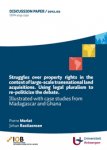- Acaparamiento de tierra
-
Politicas de tierra
- Por una nueva política de tierras agricolas en Francia
- Políticas de tierra e historia agraria en Europa
- Políticas de tierra en el medio rural en Francia durante el siglo XX
- La tenencia de la tierra en Africa occidental. Documentos pedagógicos.
- Reformas Agrarias en el Mundo
- La experiencia del Código Rural en el Níger
- Políticas de tierra y Reforma Agraria. Cuaderno de propuestas.
- Bosques
- Agua
- Gobernanza de los territorios
- FMAT - Foro Mundial sobre el Acceso a la Tierra 2016
- Otras Conferencias y Foros internacionales
- Videos de conferencias - Reuniones Temáticas de AGTER
- Entrevistas con algunos miembros de AGTER
- Capacitación - Enseñanza
- Formación - Viajes de estudio
- Enseñanza - Modulos de capacitación
- Editoriales - Boletín de información de AGTER
- Preservar el medio ambiente y los grandes equilibrios ecológicos
- Mejorar la participación de los pueblos a la toma de decisión a nivel nacional y a nivel local
- Respetar los derechos humanos fundamentales. Disminuir las desigualdades
- Construir una gobernanza mundial eficaz. Construir la paz
- Hacer que la producción agrícola cumpla eficientemente con sus roles. Eliminar el hambre
- Valorar y proteger la diversidad cultural
- Tomar en cuenta las necesidades de las futuras generaciones. Administrar los «comunes»
Título, subtítulo, autores. Búsqueda en www.agter.org y en www.agter.asso.fr
Búsqueda en texto completo con Google
Struggles over property rights in the context of large-scale transnational land acquisitions. Using legal pluralism to re-politicize the debate
Illustrated with case studies from Madagascar and Ghana
Escrito por: Pierre Merlet, Johan Bastiaensen
Fecha de redaccion:
Organizaciones: University of Antwerp, Association pour contribuer à l’Amélioration de la Gouvernance de la Terre, de l’Eau et des Ressources naturelles (AGTER)
Tipo de documento: Artículo científico
Resumen
Abstract
A key issue in the context of increasing large-scale land acquisitions in developing countries is how poor populations can prevent their land rights being encroached upon by more powerful actors. To date, the majority of policy recommendations have been directed towards the legal recognition and formalization of land rights in order to safeguard local and historical land rights holders, as well as towards the design and implementation of ‘voluntary’ guidelines or codes of conduct which should regulate large-scale investments in land, in order to contribute to positive development outcomes. We argue, however, that these types of recommendations tend to depoliticize the debate surrounding access to land and natural resources. This paper therefore aims to reintroduce a political dimension into the analysis, by proposing a framework based on the socio-institutional definition of land rights consistent with the legal pluralist approach. It acknowledges a multiplicity of land rights and rights holders, governed by the existence of several superimposed normative orders and social fields. It also implies that state and non-state normative orders interact to determine land management practices and, as a result, also the actual ‘rules in use’ that are followed and enforced locally.

We demonstrate the analytical potential of this theoretical framework using case studies from Ghana and Madagascar, two countries with different legal traditions and distinct levels of recognition of non-state tenure systems. Our tentative analysis reveals that what is fundamentally at stake are power relations and social struggles between actors in a variety of social fields. The key is therefore to strengthen the bargaining capacity of weaker actors within certain political arenas when it comes to land. Their capacity is not unrelated to the nature of formal national and international legal orders, since these co-shape and affect actors’ bargaining position, but we should not expect a one-way relationship between formal rules and the effective enforcement of the rights of the poor. Related issues that will also play a critical role in the analysis are broader discursive struggles regarding the concept of ‘idle land’; the role of small-scale family production versus large-scale entrepreneurial production in agricultural development; and the requirements of social and environmental sustainability.
Pierre Merlet holds a Master’s degree in Globalization and Development and is currently a PhD candidate at the IOB. He is also an active member of the international association AGTER
Johan Bastiaensen is a senior lecturer at the University of Antwerp’s Institute of Development Policy and Management (IOB)
Descargar el documento
Carpeta
Desafió
Zona geográfica
Ver también
- Pluralisme juridique et gestion de la terre et des ressources naturelles
- Legal pluralism and management of land and natural resources
- Pluralismo jurídico y gestión de la tierra y los recursos naturales
Traducción
Organizaciones



 Agter participa en la Coredem
Agter participa en la Coredem